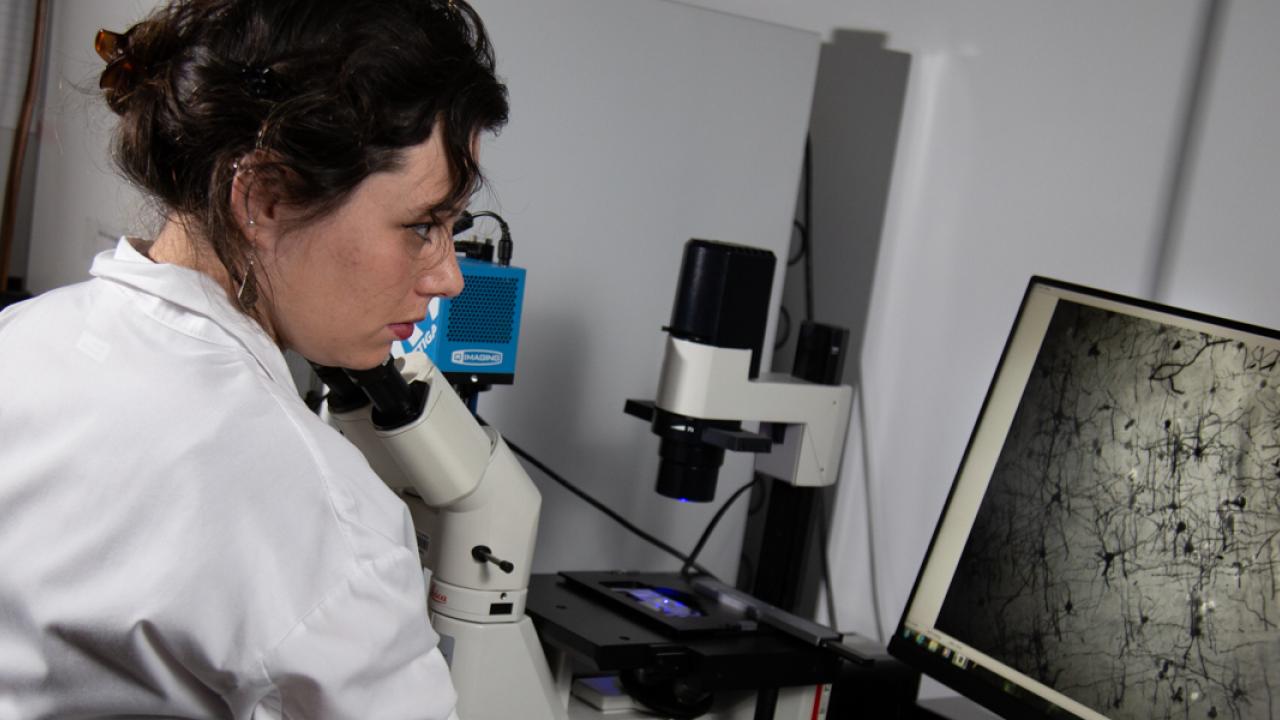
Neuroscience Ph.D. Candidate Lindsay Cameron Named 2021 Harold M. Weintraub Graduate Student Award Recipient
Last month, Fred Hutchinson Cancer Research Center announced the recipients of the 2021 Harold M. Weintraub Graduate Student Award, which recognizes outstanding achievement in graduate studies in the biological sciences. The 13 award recipients were selected for the quality, originality and significance of their work, representing a diverse range of research topics. Lindsay Cameron, a UC Davis neuroscience Ph.D. candidate and two-time Grad Slam finalist, was among this year's award recipients.
A member of the Olson Lab, Cameron's doctoral research has focused on understanding the therapeutic mechanism of action of psychedelic compounds. She aims to understand if the hallucinogenic properties of psychedelics are necessary to achieve therapeutic effects, or if these two phenomena are dissociable. Using primary neuronal cell culture and animal behavior studies, Lindsay has determined that the perceptual disturbances (hallucinations) and therapeutic properties can indeed be decoupled. Together, Lindsay and her colleagues have developed and tested novel rapid-acting antidepressants that are non-hallucinogenic. These data provide an important starting point for the design of safer next-generation therapeutics for treating depression, post-traumatic stress disorder, and addiction.
Nominations for this prestigious annual award are solicited internationally. This year’s awardees come from across the U.S. — from the University of California, Los Angeles to the University of Texas Southwestern Medical Center to Harvard University — and three international recipients from the University of Basel, Switzerland, the University of St. Andrews, UK, and the Institute of Science and Technology, Austria. The awardees study a range of biological topics including adoptive immune cell transfer, gene expression regulation, inter-brain neural dynamics and tumor cell interactions that increase cancer spread.
The Weintraub Award began in 2000 and is now in its 22nd year. It’s named for Dr. Harold “Hal” Weintraub, who helped found the Basic Sciences Division at Fred Hutch and died of brain cancer in 1995 at age 49. The award honors Weintraub’s scientific leadership in the field of molecular biology and his legacy as an extraordinary mentor, colleague, collaborator and friend.
“Hal was admired for his scientific rigor and creativity. He frequently asked himself and his colleagues, ‘How do you know that? Why do you believe that?’ until he had defined the borders between knowledge and belief,” said Dr. Stephen Tapscott, a longtime friend and postdoctoral student of Weintraub’s who is now a member of the Human Biology Division at Fred Hutch.
The award is supported by the Weintraub/Groudine Fellowship for Science and Human Disease, which was established to foster intellectual exchange through the promotion of programs for graduate students, fellows and visiting scholars.
“The Weintraub Graduate Student Awards commemorate Hal’s commitment to advancing knowledge and recognizes insightful scientific contributions to our scientific community. Our outstanding awardees have answered the question ‘How do you know that?’ which will help us all refine our approach to the important questions in science,” Tapscott said.
